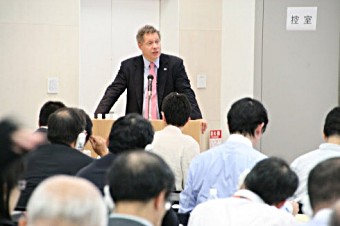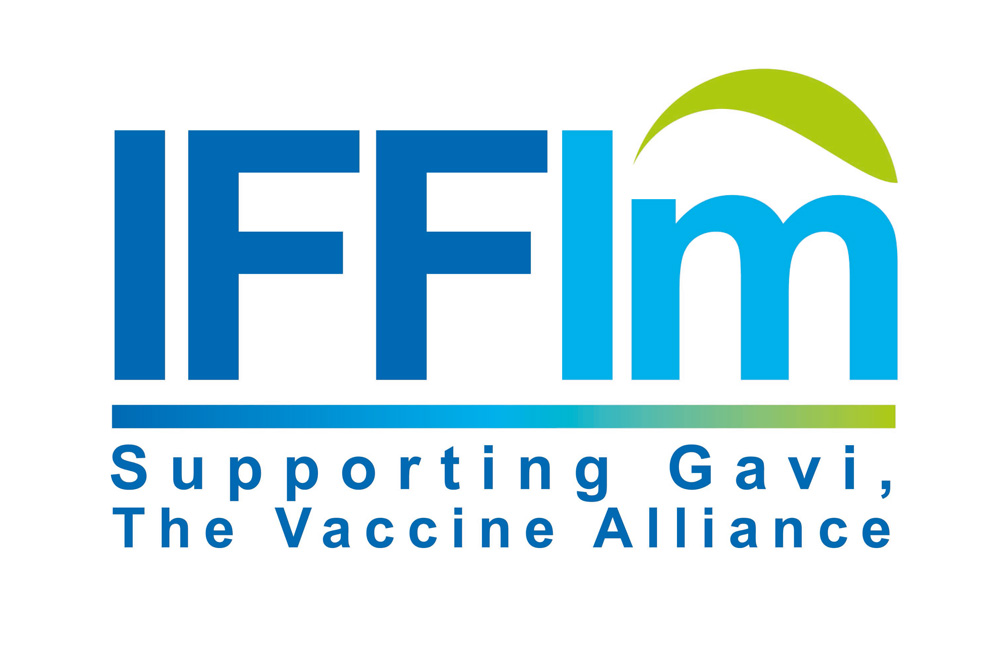GAVI initiatives applauded in Japan
- Press Releases
- GAVI initiatives applauded in Japan
GAVI initiatives applauded in Japan
11 October 2012

GAVI’s success in partnering with the private sector highlighted at a global health symposium of Japanese companies in Tokyo.
Programmes in public-private partnership, such as IFFIm, held up as models for Japanese corporate sector
GAVI CEO Dr. Seth Berkley was a featured speaker at a global health symposium that included five Japanese companies, the Japanese Foreign Ministry, UNICEF and HGPI.
Tokyo, 11 October 2012 – GAVI’s success in partnering with the private sector was highlighted at a global health symposium of Japanese companies in Tokyo today, supported by the Japanese Ministry of Foreign Affairs.
Companies can “make a reasonable profit and help people at the same time,” said Shiro Konuma, director of the Global Health Policy Division within the Japanese Ministry of Foreign Affairs.
“Governments always must keep in mind the raison d’etre of private companies. That is the starting point. But we all share the responsibility to help save lives.”
Vaccine bonds
Japan recently made its second direct donation to GAVI, and the Japanese public has been responsible for about a quarter of GAVI’s funding through Japan’s uridashi bond market, noted GAVI CEO Seth Berkley, a featured speaker alongside those from the Health & Global Policy Institite (HGPI) think tank, and a panel discussion with five Japanese companies and UNICEF.
Among them was Daiwa Securities, which helped introduce “vaccine bonds” in Japan to benefit GAVI through IFFIm, the International Finance Facility for Immunisation. IFFIm overall has raised US$ 3.7 billion through bonds backed by the pledges of nine donor governments, funding about half of GAVI’s programmes, Berkley notes. And about US$ 2 billion of it has come from Japanese investors.
IFFIm link
IFFIm was consistently cited by the panel as an example of good business that has benefited public health. It “seems like water and oil, but IFFIm is the link,” said Satoru Yamamoto, director/head of International Investors Services at Daiwa. Underwriters like Daiwa can expand and market their business to Japanese investors, who secure both a financial and a social return.
"Vaccines represent the finest example of partnerships between the private sector and public sector" said Dr. Tadataka Yamada, Chief Medical and Science Officer at Takeda Pharmaceutical Company
GAVI also works closely with pharmaceutical suppliers through its Advance Market Commitment initiative to help make the pneumococcal vaccine affordable to developing countries. This was one of several examples cited by the panel of how suppliers are profitably expanding their business while also promoting public health.
Second golden age of new vaccines
“Vaccines represent the finest example of partnerships between the private sector and public sector,” said keynote speaker Dr. Tadataka Yamada, Chief Medical and Science Officer at Takeda Pharmaceutical Company, the largest supplier in Japan.
He cited expanded U.S. liability protection of suppliers that led to a “second golden age” of new vaccines (after those against smallpox and polio), including three supported by GAVI: pneumococcal, rotavirus and HPV vaccines. “The impact is incalculable.”
But time and again, participants returned to the view that good public-private partnerships must mean good business. “If we want to grow, it will be in the developing world” by providing them with affordable medicines, vaccines and technologies, said Dr. BT Slingsby, director of Global Access Strategies at Eisai, a Japan-based pharmaceutical company.
Case studies
Case studies offered at the symposium by Esai, Daiwa, medical imaging/camera company Fujifilm and food/chemical company Ajinomoto “shows what the private sector can do with a job that used to be done by the government,” said keynote speaker Kiyoshi Kurokawa, chairman of the Health & Global Policy Institute (HGPI), a Tokyo-based think tank and co-sponsor of the symposium, attended by about 135 people.
GAVI, for example, now is working with corporate partners through the GAVI Matching Fund to “bring their tools to this very important mission,” Berkley said. This could help solve obstacles to immunisation, such as the need to monitor vaccine supplies and keep them in cold storage in remote areas, Berkley.
“You might ask, ‘Why should the private sector engage in this discussion?” Berkley concluded. “Healthy people mean healthy markets. These are places that are likely to see growth in the future and become partners in this very shared earth.”
Share this article
Restricted Access Library
 The material in this Restricted Access Library is intended to be accessed only by persons with residence within the territory of a Member State of the European Union and is not intended to be viewed by any other persons. The material in this Restricted Access Library is provided by IFFIm for information purposes only and the materials contained herein were accurate only as of their respective dates. Certain information in the materials contained herein is not intended to be, and is not, current. IFFIm accepts no obligation to update any material contained herein.
The material in this Restricted Access Library is intended to be accessed only by persons with residence within the territory of a Member State of the European Union and is not intended to be viewed by any other persons. The material in this Restricted Access Library is provided by IFFIm for information purposes only and the materials contained herein were accurate only as of their respective dates. Certain information in the materials contained herein is not intended to be, and is not, current. IFFIm accepts no obligation to update any material contained herein.
Persons with residence outside the territory of a Member State of the European Union who have access to or consult any materials posted in this Restricted Access Library should refrain from any action in respect of the securities referred to in such materials and are otherwise required to comply with all applicable laws and regulations in their country of residence.
By clicking Access restricted content: DYNAMIC-LINK-TEXT I confirm that I have read and understood the foregoing and agree that I will be bound by the restrictions and conditions set forth on this page.
The materials in this Restricted Access Library are for distribution only to persons who are not a "retail client" within the meaning of section 761G of the Corporations Act 2001 of Australia and are also sophisticated investors, professional investors or other investors in respect of whom disclosure is not required under Part 6D.2 of the Corporations Act 2001 of Australia and, in all cases, in such circumstances as may be permitted by applicable law in any jurisdiction in which an investor may be located.
The materials in this Restricted Access Library and any documents linked from it are not for access or distribution in any jurisdiction where such access or distribution would be illegal. All of the securities referred to in this Restricted Access Library and in the linked documents have been sold and delivered. The information contained herein and therein does not constitute an offer for sale in the United States or in any other country. The securities described herein and therein have not been, and will not be, registered under the U.S. Securities Act of 1933, as amended (the "Securities Act"), and may not be offered or sold in the United States except pursuant to an exemption from, or in a transaction not subject to, the registration requirements of the Securities Act and in compliance with any applicable state securities laws.
Each person accessing the Restricted Access Library confirms that they are a person who is entitled to do so under all applicable laws, regulations and directives in all applicable jurisdictions. Neither IFFIm nor any of their directors, employees, agents or advisers accepts any liability whatsoever for any loss (including, without limitation, any liability arising from any fault or negligence on the part of IFFIm or its respective directors, employees, agents or advisers) arising from access to Restricted Access Library by any person not entitled to do so.
"Relief" for mothers in Bayelsa state as malaria vaccine makes waves
07 November 2025
